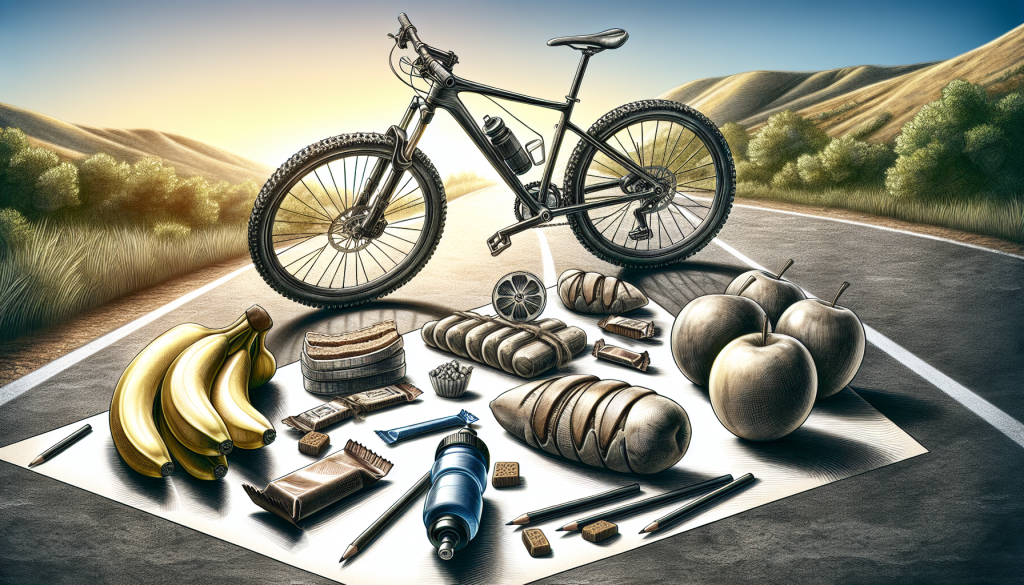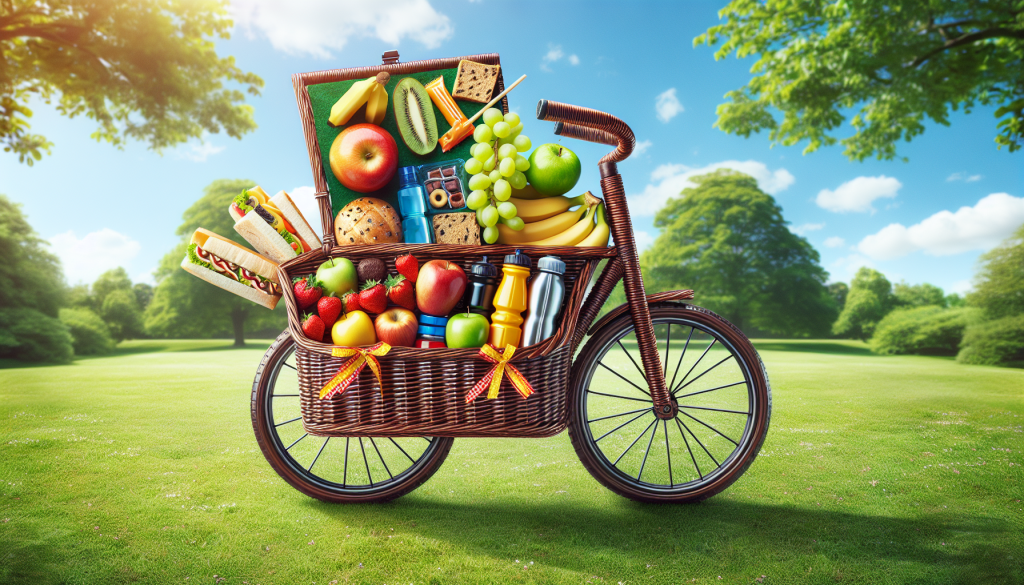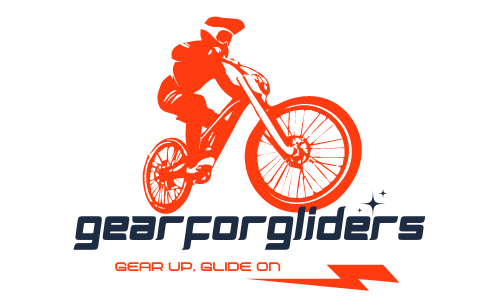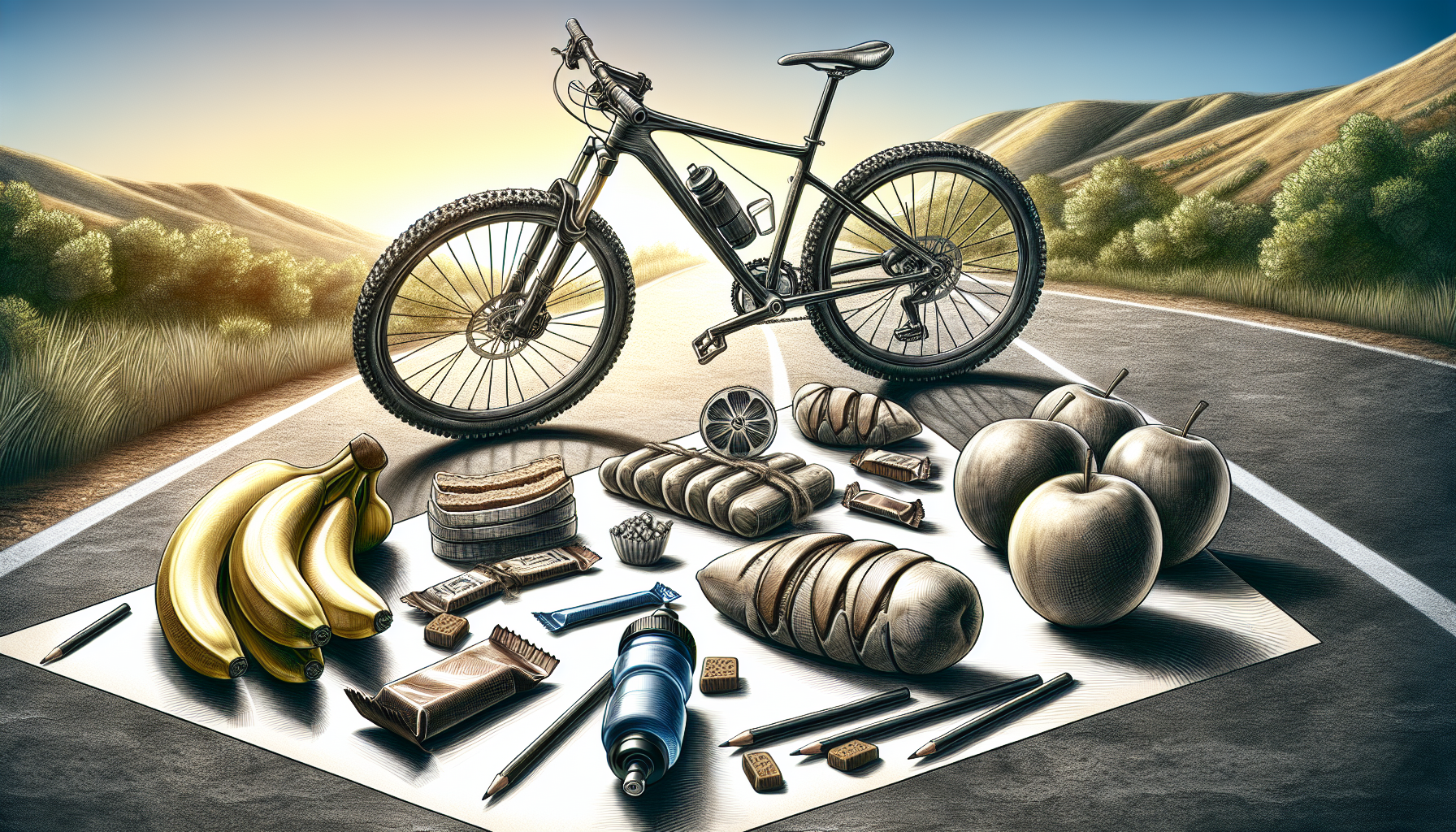Planning a long bike ride can be an exhilarating experience, but when it comes to fueling your body during the journey, what food should you pack? Making sure you have the right snacks and meals to sustain your energy is crucial. Whether you’re a seasoned cyclist or new to the sport, this article will guide you through the best food choices to take on a long bike ride, ensuring that you have the sustenance you need to power through your journey. So, hop on your bike, let’s explore the perfect food options for your next adventure on two wheels!

Importance of Proper Nutrition on a Long Bike Ride
Proper nutrition is crucial when embarking on a long bike ride. Fueling your body with the right nutrients will not only help you maintain energy levels but also enhance your performance and promote a quick recovery. In this article, we will explore the different aspects of nutrition that are important before, during, and after a long bike ride. It’s time to optimize your nutrition and take your riding experience to the next level!
Fueling Your Body
When you hop onto your bike for a long ride, your body becomes a machine that requires fuel to keep going. Just like a car needs gasoline to run, your body needs energy to pedal those miles. The key to fueling your body lies in consuming the right types of nutrients, including carbohydrates, protein, and healthy fats.
Maintaining Energy Levels
Sustaining your energy levels throughout a long bike ride is vital to ensure you have the stamina to keep going. Carbohydrates play a crucial role in providing sustained energy as they are easily broken down and converted into glucose. By consuming carbohydrates before and during your ride, you can prevent energy crashes and maintain a consistent level of stamina.
Enhancing Performance
Proper nutrition not only helps you maintain energy levels but also enhances your performance on the bike. Consuming the right balance of macronutrients will provide your muscles with the necessary fuel to optimize performance. It’s important to find the perfect balance of carbohydrates, protein, and healthy fats to ensure your body operates at its peak efficiency.
Promoting Recovery
After a long bike ride, your body needs to recover and repair itself. This is where nutrition plays a crucial role. Consuming the right post-ride foods will aid in muscle recovery, replenish glycogen stores, and reduce inflammation. Providing your body with the necessary nutrients and hydration after a ride will promote a quicker recovery and help you get back on the bike in no time.
Pre-Ride Nutrition
Before embarking on your long bike ride, it’s essential to fuel your body with the right nutrients. Here are a few key components of pre-ride nutrition to consider:
Carbohydrates for Sustained Energy
Carbohydrates should be the main focus of your pre-ride meal. Opt for complex carbohydrates like whole grains, fruits, and vegetables. These will provide sustained energy throughout your ride, preventing energy crashes and keeping you fueled for the long haul.
Protein for Muscle Repair
Including a moderate amount of protein in your pre-ride meal is essential to aid in muscle repair and recovery. Consider lean sources of protein such as chicken, fish, tofu, or beans. These will provide the necessary amino acids your muscles need to recover from the demands of the ride.
Hydration and Electrolytes
Hydration is key before, during, and after your ride. Ensure you are properly hydrated before hitting the road by drinking plenty of fluids. Additionally, consider consuming electrolyte-rich foods or beverages to replenish the electrolytes lost through sweating.
Avoiding Heavy and Greasy Foods
While it can be tempting to indulge in a heavy meal before a long bike ride, it’s best to steer clear of heavy and greasy foods. These can cause digestive discomfort, slow you down, and hinder your overall performance. Stick to lighter, nutrient-dense meals that will provide you with sustained energy without weighing you down.
On-the-Ride Snacks and Meals
During your long bike ride, it’s important to consume snacks and meals that provide quick and easily digestible energy. Here are some ideas for on-the-ride fuel:
Energy Bars and Gels
Energy bars and gels are a convenient and portable way to fuel your body during a ride. Look for options that provide a balance of carbohydrates, protein, and healthy fats. Be sure to choose bars or gels that agree with your stomach and are easy to consume while on the move.
Fruits and Dried Fruits
Fruits are a natural source of carbohydrates, vitamins, and minerals. Opt for easily portable options like bananas, apples, or oranges. Dried fruits, such as raisins or apricots, are also a great choice as they provide a concentrated source of energy in a compact form.
Trail Mix and Nuts
Trail mix is a popular choice among cyclists due to its combination of carbohydrates, protein, and healthy fats. Look for mixes that include a variety of nuts, seeds, and dried fruits. Nuts, like almonds or cashews, are also a great standalone option for a quick energy boost.
Sandwiches or Wraps
For longer rides, consider packing a sandwich or wrap that includes a balance of carbohydrates, protein, and healthy fats. Fillings like lean meats, vegetables, and spreads can provide sustained energy and keep you satisfied throughout your ride.
Homemade Energy Balls
Energy balls made with a combination of oats, nut butter, honey, and other nutritious ingredients are a tasty and convenient option for on-the-ride snacking. These homemade treats can be customized to suit your taste preferences and provide a quick burst of energy.
Hydration Bladder or Water Bottles
Proper hydration is essential during a long bike ride. A hydration bladder or water bottles attached to your bike will ensure that you can easily access fluids and stay hydrated throughout your journey. Remember to sip water regularly to avoid dehydration.
Post-Ride Recovery Foods
After a challenging bike ride, your body needs proper nutrition to recover and repair itself. Here are some essential post-ride recovery foods to include in your diet:
Protein-Rich Foods for Muscle Recovery
Protein is key for muscle recovery and repair. Include lean sources of protein such as grilled chicken, salmon, tofu, or Greek yogurt in your post-ride meal. These will provide your body with the necessary amino acids to rebuild and strengthen your muscles.
Complex Carbohydrates for Glycogen Replenishment
Replenishing glycogen stores after a long ride is crucial for optimal recovery. Include complex carbohydrates like whole grains, sweet potatoes, or quinoa in your post-ride meal. These carbs will help replenish your energy stores and prepare you for your next ride.
Antioxidant-Rich Foods for Reducing Inflammation
Intense physical activity like a long bike ride can lead to inflammation in the body. Including antioxidant-rich foods like berries, leafy greens, or dark chocolate in your post-ride meal can help reduce inflammation and promote a quicker recovery.
Adequate Hydration to Replace Fluid Loss
Don’t forget to hydrate properly after your ride to replace the fluids lost through sweating. Water, coconut water, or electrolyte-rich beverages can help replenish your hydration levels and aid in recovery.

Meal Planning Tips
When preparing for a long bike ride, proper meal planning is essential to ensure you have the right fuel to keep you going. Here are some meal planning tips to consider:
Calculating the Right Amount of Calories
Prior to your ride, calculate the number of calories you will need based on the distance, intensity, and duration of your ride. This will help ensure you are consuming enough energy to support your performance and prevent fatigue.
Balancing Macronutrients
When planning your meals, aim to include a balanced combination of carbohydrates, protein, and healthy fats. This will provide sustained energy, aid in muscle recovery, and optimize your overall performance.
Incorporating Variety
To avoid mealtime boredom and ensure you receive a wide range of nutrients, incorporate variety into your meals. Experiment with different fruits, vegetables, proteins, and grains to keep things interesting and enjoyable.
Considering Portability and Shelf Life
When selecting foods for your ride, consider portability and shelf life. Opt for foods that can withstand the journey without spoiling, and that are easy to pack and consume while on the move.
Avoiding Excessive Sugar Consumption
While some sugar is necessary for energy during a long bike ride, it’s important to avoid excessive consumption. Too much sugar can lead to energy crashes and digestive issues. Choose natural sources of sugar, like fruits, and avoid overly processed or sugary snacks.
Food Storage and Transportation
Proper food storage and transportation are crucial to ensure your snacks and meals stay fresh and safe during your long bike ride. Here are some tips for storing and transporting food:
Insulated Cooler Bags or Backpacks
Invest in insulated cooler bags or backpacks to keep perishable items fresh and at a safe temperature. This will prevent spoilage and potential foodborne illnesses.
Sealed Containers for Fresh Food
Use sealed containers to store fresh food and prevent moisture from seeping in. This will help maintain the quality and freshness of your meals.
Reusable Food Wraps or Ziplock Bags
Opt for reusable food wraps or ziplock bags to store non-perishable items like energy bars, dried fruits, or nuts. These will keep your snacks organized and protected during your ride.
Cooling Packs or Ice Packs
Consider using cooling packs or ice packs to keep your food and drinks cool during your journey. This is especially important for hot weather or longer rides when perishable items need to stay chilled.
Timing Your Food Intake
Timing your food intake before, during, and after a long bike ride plays a significant role in maximizing your performance and recovery. Here are some considerations for timing your meals and snacks:
Pre-Ride Meal Timing
Consume a balanced meal containing carbohydrates, protein, and healthy fats 2 to 3 hours before your ride. This will give your body enough time to digest and absorb the nutrients, providing sustained energy throughout your ride.
On-the-Ride Snacking Schedule
During your ride, plan to consume snacks and smaller meals every 1 to 2 hours to maintain energy levels. This will help sustain your stamina and prevent hunger or energy crashes.
Post-Ride Recovery Window
To optimize your recovery, aim to consume a post-ride meal within 30 minutes to an hour after your ride. During this time, your body is most receptive to replenishing glycogen stores and initiating muscle repair.
Special Considerations
When it comes to nutrition during a long bike ride, there are some special considerations to keep in mind:
Dietary Restrictions and Allergies
If you have dietary restrictions or allergies, it’s important to plan your meals and snacks accordingly. Identify suitable alternatives and ensure you have enough options that cater to your specific needs.
Adequate Electrolyte Replacement
Proper electrolyte replacement is crucial during a long bike ride, especially if you are sweating excessively. Consider consuming electrolyte-rich foods or beverages, or opt for sports drinks that provide a balance of electrolytes.
Avoiding Digestive Issues
Some foods can be harder to digest during a long bike ride, leading to discomfort or digestive issues. Experiment with different foods during training rides to identify which ones work best for your digestive system and stick to those options on the day of your long ride.
Conclusion
Proper nutrition is essential when embarking on a long bike ride. Fueling your body with the right nutrients before, during, and after your ride will help maintain energy levels, enhance performance, and promote a quick recovery. Remember to focus on carbohydrates for sustained energy, include protein for muscle repair, prioritize hydration, and consume a variety of nutrient-rich foods. By following these guidelines and planning your meals and snacks accordingly, you can optimize your riding experience and achieve your cycling goals. Enjoy your ride and happy fueling!

I’m James Gheen, the creator behind GearForGliders.com. As a mountain biking enthusiast, I understand the thrill of gliding through diverse terrains with confidence and agility. That’s why I’ve created this website to provide a comprehensive selection of mountain biking gear tailored to meet the needs of riders who prioritize smoothness, speed, and control. From high-performance bikes to specialized apparel and protective gear, I offer top-quality products that enhance your mountain biking experience. I also provide expert advice, reviews, and tips, creating a community of like-minded individuals who share a passion for the art of mountain biking. Gear up and glide on with GearForGliders.com.

